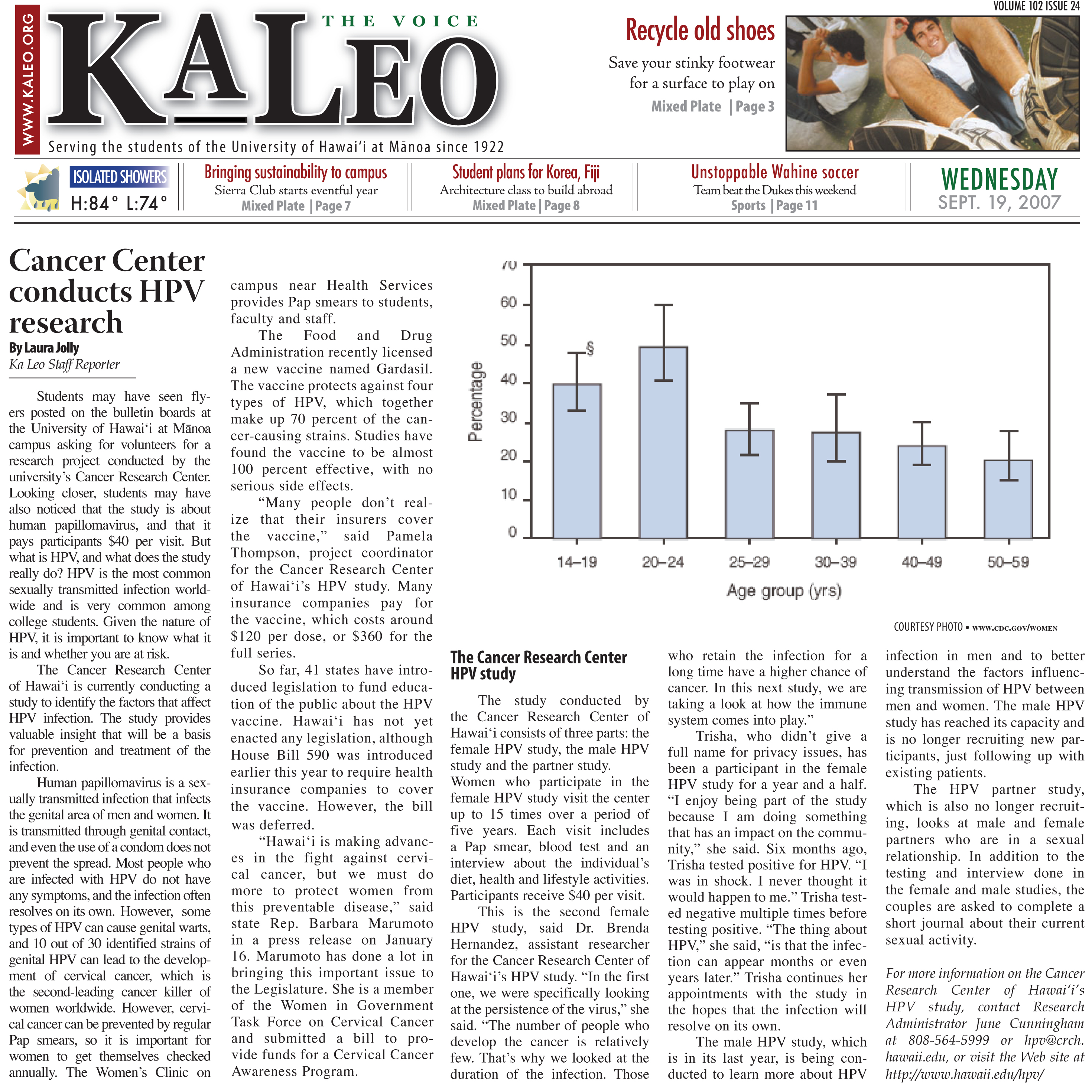Originally published in Ka Leo, UH Mānoa’s student-run newspaper – September 19, 2007
CANCER CENTER CONDUCTS HPV RESEARCH (Click for the PDF version) (View online at kaleo.org)
Students may have seen flyers posted on the bulletin boards at the University of Hawai‘i at Mānoa campus asking for volunteers for a research project conducted by the university’s Cancer Research Center. Looking closer, students may have also noticed that the study is about human papillomavirus, and that it pays participants $40 per visit. But what is HPV, and what does the study really do? HPV is the most common sexually transmitted infection worldwide and is very common among college students. Given the nature of HPV, it is important to know what it is and whether you are at risk.
The Cancer Research Center of Hawai‘i is currently conducting a study to identify the factors that affect HPV infection. The study provides valuable insight that will be a basis for prevention and treatment of the infection.
Human papillomavirus is a sexually transmitted infection that infects the genital area of men and women. It is transmitted through genital contact, and even the use of a condom does not prevent the spread. Most people who are infected with HPV do not have any symptoms, and the infection often resolves on its own.
However, some types of HPV can cause genital warts, and 10 out of 30 identified strains of genital HPV can lead to the development of cervical cancer, which is the second-leading cancer killer of women worldwide. But cervical cancer can be prevented by regular Pap smears, so it is important for women to get themselves checked annually. The Women’s Clinic on campus near Health Services provides Pap smears to students, faculty and staff.
The Food and Drug Administration recently licensed a new vaccine named Gardasil. The vaccine protects against four types of HPV, which together make up 70 percent of the cancer-causing strains. Studies have found the vaccine to be almost 100 percent effective, with no serious side effects.
“Many people don’t realize that their insurers cover the vaccine,” said Pamela Thompson, project coordinator for the Cancer Research Center of Hawai‘i’s HPV study. Many insurance companies pay for the vaccine, which costs around $120 per dose, or $360 for the full series.
So far, 41 states have introduced legislation to fund education of the public about the HPV vaccine. Hawai‘i has not yet enacted any legislation, although House Bill 590 was introduced earlier this year to require health insurance companies to cover the vaccine. However, the bill was deferred.
“Hawai‘i is making advances in the fight against cervical cancer, but we must do more to protect women from this preventable disease,” said state Rep. Barbara Marumoto in a press release on January 16. Marumoto has done a lot in bringing this important issue to the Legislature. She is a member of the Women in Government Task Force on Cervical Cancer and submitted a bill to provide funds for a Cervical Cancer Awareness Program.
The Cancer Research Center HPV study
The study conducted by the Cancer Research Center of Hawai‘i consists of three parts: the female HPV study, the male HPV study and the partner study.
Women who participate in the female HPV study visit the center up to 15 times over a period of five years. Each visit includes a Pap smear, blood test and an interview about the individual’s diet, health and lifestyle activities. Participants receive $40 per visit.
This is the second female HPV study, said Dr. Brenda Hernandez, assistant researcher for the Cancer Research Center of Hawai‘i’s HPV study. “In the first one, we were specifically looking at the persistence of the virus,” she said. “The number of people who develop the cancer is relatively few. That’s why we looked at the duration of the infection. Those who retain the infection for a long time have a higher chance of cancer. In this next study, we are taking a look at how the immune system comes into play.”
Trisha, who didn’t give a full name for privacy issues, has been a participant in the female HPV study for a year and a half. “I enjoy being part of the study because I am doing something that has an impact on the community,” she said. Six months ago, Trisha tested positive for HPV. “I was in shock. I never thought it would happen to me.” Trisha tested negative multiple times before testing positive. “The thing about HPV,” she said, “is that the infection can appear months or even years later.” Trisha continues her appointments with the study in the hopes that the infection will resolve on its own.
The male HPV study, which is in its last year, is being conducted to learn more about HPV infection in men and to better understand the factors influencing transmission of HPV between men and women. The male HPV study has reached its capacity and is no longer recruiting new participants, just following up with existing patients.
The HPV partner study, which is also no longer recruiting, looks at male and female partners who are in a sexual relationship. In addition to the testing and interview done in the female and male studies, the couples are asked to complete a short journal about their current sexual activity.
For more information on the Cancer Research Center of Hawai‘i’s HPV study, contact Research Administrator June Cunningham at 808-564-5999 or [email protected], or visit the Web site at http://www.hawaii.edu/hpv/

